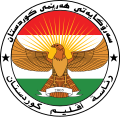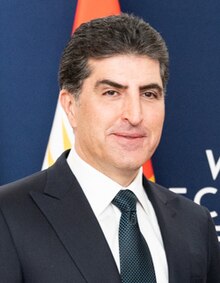President of Kurdistan Region
 From Wikipedia the free encyclopedia
From Wikipedia the free encyclopedia
| President of Kurdistan Region | |
|---|---|
 Seal of the President | |
 Flag of the President | |
since 10 June 2019 | |
| Style | His Excellency |
| Appointer | elected in KRG parliament (if possible) |
| Term length | Four years, renewable once |
| Inaugural holder | Jalal Talabani (de facto) Masoud Barzani (de jure) |
| Formation | 4 July 1992 (de facto) 14 June 2005 (de jure) |
| Deputy | Vice President of Kurdistan Region |
| Website | presidency |
The President of Kurdistan Region is the head of semi-autonomous Kurdistan Region in northern Iraq. They are part of the Kurdistan Presidency Council.[1] The current President of Kurdistan Region is Nechirvan Barzani, who assumed office on 10 June 2019.[2]
List of presidents
[edit]1992–2005
[edit]After the 1992 parliamentary election resulted in the two main parties, the Kurdistan Democratic Party (KDP) and the Patriotic Union of Kurdistan (PUK), each holding 50 out of 100 seats, they decided to create a unity government (which was not recognized by the Ba'athist Iraq, led by Saddam Hussein).[3]

The unity government soon collapsed and in 1994 a civil war broke out, which lasted until 1998. This resulted in the establishment of two Kurdistan Regional Governments in 1996, a KDP-controlled one in Erbil and a PUK-controlled one in Sulaymaniyah, each with their own President.[3]
PUK-controlled part[edit]President of the PUK-run Kurdistan Regional Government:[4]
| KDP-controlled part[edit]President of the KDP-run Kurdistan Regional Government:[4]
| ||||||||||||||||||||||||||||||||||
2005–present
[edit]After an official reconciliation between the KDP and PUK in October 2002,[5] parliamentary elections were held on 30 January 2005 and on 14 June 2005 the KDP-leader Masoud Barzani was sworn in by the parliament in as new president and Kosrat Rasul Ali as the new Vice President of Kurdistan Region.[6] In 2009 the system was changed to elect the president and on 25 July 2009 presidential elections were held resulting in Barzani's re-election.[7] On 29 October 2017, amidst the 2017 Iraqi–Kurdish conflict, Barzani announced his intentions to step down as president, effective 1 November.[8]
President of Kurdistan Region:
| No. | Portrait | Name (Birth–Death) | Term of office | Political party | ||
|---|---|---|---|---|---|---|
| Took office | Left office | Time in office | ||||
| 1 |  | Masoud Barzani (born 1946) | 14 June 2005 | 1 November 2017 | 12 years, 140 days | Kurdistan Democratic Party |
| 2 |  | Nechirvan Barzani (born 1966) | 10 June 2019 | Incumbent | 5 years, 157 days | Kurdistan Democratic Party |
Timeline
[edit]
Election results
[edit]This section needs to be updated. (June 2019) |
| Candidate | Popular votes | Percentage |
|---|---|---|
| Massoud Barzani | 1,266,397 | 69.6 |
| Kamal Mirawdily | 460,323 | 25.3 |
| Halow Ibrahim Ahmed | 63,377 | 3.5 |
| Ahmed Mohammed Rasul | 18,890 | 1.4 |
| Hussein Garmiyani | 10,665 | 0.6 |
| Total | 1,819,652 [1] | 100% |
See also
[edit] |
|---|
References
[edit]- ^ "KRG". Archived from the original on 10 October 2017. Retrieved 3 February 2010.
- ^ "Nechirvan Barzani takes presidency of Iraq's Kurdish region, vacant since 2017". Reuters. 10 June 2019. Retrieved 24 August 2020 – via www.reuters.com.
- ^ a b Galbraith, Peter (2006), The End of Iraq: How American Incompetence Created a War without End; Simon and Schuster. ISBN 0-7432-9423-8
- ^ a b "Countries I".
- ^ "The evolution of the modern electoral process in the Kurdistan Region". Archived from the original on 10 October 2017. Retrieved 16 January 2011.
- ^ Kurdistan Region leader sworn in
- ^ Opposition set to break Iraqi Kurd stranglehold
- ^ "Iraqi Kurdish leader Massoud Barzani to step down". BBC. 29 October 2017. Retrieved 30 October 2017.


